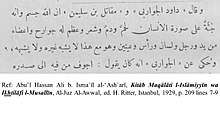Muqatil ibn Sulayman
Muqātil ibn Sulaymān (Arabic: أبو الحسن مقاتل بن سليمان البلخى, romanized: Abū-l Ḥassan Muqātil ibn Sulaymān Al-Balkhī) (d. 767 C.E.) was an 8th-century Sunni story teller of the Quran.

Ibn Sa'd's complete biography of Muqatil is "The one who had a tafsir, He related from al-Dahhak ibn Muzahim and Ata ibn Abi Rabah, students of Ibn Abbas. Some of the people of hadith were wary of his hadith and objected to them," [1] Ibn Sa'd describes him as one of the Fuqaha' and Hadith scholars in Khurasan and does not give him a date of death. There is however unanimous consensus that Muqatil was not a scholar. He did not use the isnaads (chains of narration) properly. Amidst the scholars of Islam, Muqatil's reputation is that of a storyteller.[2]
Muqatil is the alleged author of a tafsir (commentary) on the Quran that John Wansbrough considers the oldest surviving complete tafsir and discusses in some detail.[3] This work was still in manuscript when Wansbrough wrote but has since been published.[4]
He also played some part in the civil war during the caliphate of Marwan ibn Muhammad.[5]
His views on divine anthropomorphism were notorious to later generations, but in spite of his “extreme” corporealism, he employed ta'wil in his tafsir even on verses on the attributes of Allah believed by many to show the contradiction in his thought.[6]
References
- Aisha Bewley (trans) "The Men of Madina, volume 1" 1997 page 231
- Calder, Norman; Mojaddedi, Jawid; Rippin, Andrew (March 2004). Classical Islam: A Sourcebook of Religious Literature. ISBN 9781134551705.
- John Wansbrough, "The Sectarian Milieu" 2006 (original 1978)
- see John Wansbrough, "Quranic Studies" 2005 (original 1977) page xli
- "The History of al-Tabari, volume 27" 1985
- Wesley Williams, ASPECTS OF THE CREED OF IMAM AHMAD IBN HANBAL: A STUDY OF ANTHROPOMORPHISM IN EARLY ISLAMIC DISCOURSE. Int. J. Middle East Stud. 34 (2002), 441–463.